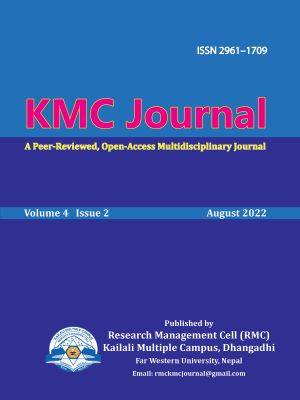Becoming an Autonomous Learner in Nepalese EFL Context An Autoethnographic Study
DOI:
https://doi.org/10.3126/kmcj.v4i2.47727Keywords:
Learner Autonomy, autonomous EFL learner, personal diary, higher studyAbstract
This autoethnographic study explores the researcher’s own perceptions on learner autonomy in English as a Foreign Language (EFL) context of Nepal. I collected the data from my experiences of learning English at Master’s level education in a campus from Kailali district under Tribhuvan University of Nepal. Using the autoethnographic research design of qualitative research, I conducted the study. More specifically, the data consisted of seven diaries written from March 2018 to April 2021. This study substantiates Vygotsky’s (1896-1934) socio-cultural theory as the main theoretical base. Furthermore, I also consulted Holec’s (1981) learner autonomy and Knowles’ (1975) self-directed learning to strengthen my experiences to reveal how I became an autonomous EFL learner. The findings of this study reveal that close academic connection with the professors and universities is essential for becoming an autonomous learner in learning EFL in the researched context. Moreover, the learner’s personal effort and rigour in the process of learning seem to be paramount for the continuation of learner autonomy.
Downloads
Downloads
Published
How to Cite
Issue
Section
License
Copyright (c) 2022 Bhan Singh Dhami

This work is licensed under a Creative Commons Attribution-NonCommercial 4.0 International License.
This license allows reusers to distribute, remix, adapt, and build upon the material in any medium or format for noncommercial purposes only, and only so long as attribution is given to the creator.




